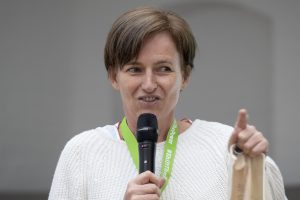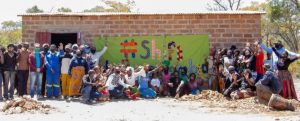Rethinking civil society resourcing
09 Jun 2022
This piece is part of a series of articles on the #ShiftThePower Treehouse exploring the topic of civil society resourcing, and why this needs to be rethought – particularly in terms of placing more value on civil society’s “intangible” assets. See other posts: Moving from the old to the new: Why it’s time to rethink civil society resourcing and Can money buy everything? Resourcing in the new system.
The tortured issue of NGO sustainability is nothing new. The “starvation cycle” in which many NGOs find themselves – highlighted most recently in the report Breaking the starvation cycle by Humentum – sees them existing from project to project and, at times even tweaking their mission to follow the money. It is no wonder that NGO leaders are kept awake at night wondering how they are going to pay their staff or their rent because the current system is simply not designed for civil society to thrive.
In Zambia (which, as a middle-income country, is starting to see international donor funding drop off) discussions around civil society sustainability have recently gained new momentum thanks to the efforts for the Zambian Governance Foundation (ZGF).
Towards greater financial independence: The story of the Zambian Governance Foundation
Since 2009, the ZGF has supported civil society organizations across Zambia through its grants programmes, capacity development activities and other learning and sharing opportunities. However, over the last five years, ZGF has radically transformed its approach to “development”, reshaping how it engages with communities by focusing on interventions that actively reinforce self-determined community-led development. Furthermore, ZGF is itself transitioning into a national community foundation-type entity that focuses on unlocking local community assets, leveraging resources from the private and philanthropic sector, holding and investing funds, making grants, serving as a donor-advised platform, and adopting a multi-issue, more holistic, approach to development. In this interview, ZGF Chief Executive Officer Barbara Nöst discusses the larger structural challenges associated with the effective resourcing of civil society and reflects on ZGF’s own journey towards financial independence.
Tell us about your journey towards financial independence? Where are you?

Barbara Nöst, Chief Executive Officer, Zambian Governance Foundation
Barbara: Our work has been gradually evolving since the organization was founded in 2009, and this evolution has been closely tied to achieving our own financial independence and organizational autonomy. At the beginning, we were entirely foreign funded. Our organizational structure and programmes were primarily designed to meet the needs and expectations of our donors. The overdependence on external funding and our status as, theoretically, an autonomous organization, presented an inbuilt tension from the outset. Over time, it not only fuelled a growing dissatisfaction within ZGF as to the role donors wanted the organization to play, but it also reinforced our desire to secure a future grounded in greater self-sufficiency and sustainability and free from the whims of international donors.
Over time we started to realize the value of a hybrid approach, which could combine managing donor funds with other strategies – such as offering paid services, investing in financial markets and treasury bills, and renting out our office space etc. – that could generate unrestricted income and help smooth over the bumps of funding gaps that we had experienced in the past. In fact, this approach has helped to finance both programmes and our operational costs since 2014. But this journey has also not just been about money: along the way, our quest for financial independence has been accompanied by a change in what one might call our organizational “DNA”, which was further accelerated in 2017 when we began to integrate community philanthropy in our work.
What does your focus on community philanthropy mean in practice?
Barbara: In our new strategy, our goal is to encourage Zambian civil society to approach development work through a community philanthropy lens and, in particular, to emphasize the power of local giving and the fact that resources exist in Zambia that often go unseen or unacknowledged. This means both challenging the perception of foreign donors as “mighty financiers” and encouraging civil society organizations to re-orient themselves towards resources entrusted to them by Zambian donors (including the private sector, local communities and individuals in the affluent middle class and diaspora). Foreign donors still have a role to play, particularly when it comes to protecting and advancing human rights, but it should be complementary rather than overpowering.
What are some of the practical challenges you have faced in this journey towards financial independence?
Barbara: In our interactions with ordinary citizens, both in peri-urban and rural communities, we commonly encounter a self-defeatist attitude, which manifests itself in community members struggling to accept that they should – and can – drive their own development. Communities’ belief systems are dominated by a dependence syndrome, evidenced by apathy and the misguided belief that external actors should fix their problems for them. In our introductory meetings with communities, we emphasize that our collaboration is premised on the readiness of community members to contribute towards whatever projects we might pursue together. This is often met with bewilderment and, in some instances, an immediate loss of interest in partnering with us. However, once communities start to understand the power of local giving and how it fits into the larger framework of a strengths-based approach to development then they come on board.
What does financial health mean for NGOs in your context?
Barbara: Recent surveys that we have conducted to understand the financial situation facing local civil society organizations before and as a result of COVID-19 have shown us that overall international funding has been in decline. In one focus group with civil society organizations, when asked how many of them would have to close their operations if external funding were withdrawn tomorrow, all but a handful – which had access to alternative sources of funding – answered in the affirmative. We need to find new ways to appreciate and value community and organizational assets – not just money or buildings, but also things like a strong membership base and / or constituency, credibility, social capital and, most importantly, skilled and committed staff that have a deep commitment to the objectives of the organization. When push comes to shove, a long-term vision, a strong and resilient core team, along with some reserves, can help you survive the difficult journey of mobilizing resources that can otherwise easily turn into a wild roller coaster ride.
Why is the topic of civil society financing important to ZGF and why should other civil society organizations be concerned?
Barbara: The importance of effective and multi-layered strategies for civil society resourcing cannot be emphasized enough. We need to find new ways to think about and communicate about our resources in ways that go beyond just money and that acknowledge the existence and importance of the other essential assets – such as reputation, experience, networks, trust etc.
In Zambia, local civil society organizations should be concerned, as the funding landscape has changed drastically in recent years. There are new financing instruments coming our way that we have no understanding of. Climate finance, under the guise of “carbon finance”, “innovative financing”, “energy finance” and “impact investments”, has found its way into Zambia, using various mechanisms we are unable to interpret and access. Local civil society must join hands and form collectives and jointly approach these new funders to ensure financing is trickling down to local organizations working at the grassroots.
How are you planning to take forward the topic of civil society resourcing?
Barbara: Civil society resourcing is a central theme for all civil society leaders and it is important to keep the topic alive and relevant. At ZGF we have already been experimenting with alternative models of attracting alternative resources and we will continue sharing our story for local Zambian civil society organizations to learn from.



